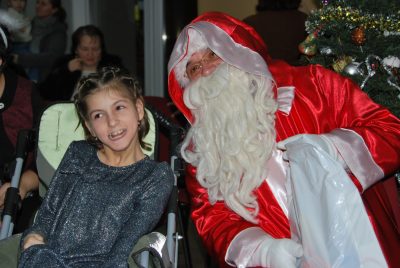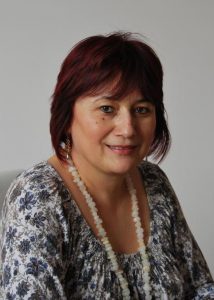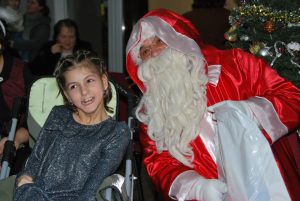Eurordis Unveils Integrated-care Initiative for Rare Disease Patients

Tetraparesis patient Mierea Jessica, 14, has benefited from holistic care at Romania's NoRo Center. (Photo courtesy of NoRo Center)
Europe’s umbrella organization for 800 rare disease associations has developed a sweeping initiative to help the continent’s 30 million rare disease patients and their caregivers learn about their conditions, find assistance and receive treatment.
Eurordis-Rare Diseases Europe hopes to improve the current piecemeal treatment and support program with a holistic, integrated-care approach by 2030.
The payoff will include better care and less strain on patients and caregivers, said Raquel Castro, the Paris-based organization’s social policy director. She spoke to BioNews Services, which publishes this website, at a May 17-19 conference in Bucharest, Romania.
By holistic care, Eurordis means treatment, healthcare and a range of support beyond the social services traditionally associated with rare diseases. This includes programs to help patients lead fuller social lives, take advantage of educational and job opportunities, and deal with the depression that often accompanies poor health.
The Eurordis integrated-care initiative — seven years in the making — is spelled out in a position paper that includes 10 broad recommendations and dozens of more specific suggestions for European governments, treatment providers, social service agencies and others.
“People living with rare diseases and their families played a crucial role in shaping the position paper by giving us their thoughts and ideas all along the way,” Castro said. “This is about reorganizing and connecting elements that already exist to achieve integrated care, not necessarily starting new programs.”
A holistic-care linchpin that Eurordis already has helped start is RareResourceNet. These one-stop treatment and services facilities across Europe include the NoRo Center in predominantly rural northern Romania.
“The centers offer specialized health-care and rehabilitation services,” said Dorica Dan, president of the Romanian National Alliance for Rare Diseases and the driving force behind NoRo. “They also give patients capacity-building help by providing them with information and skills in disease and life management.”
Eurordis based some of its recommendations on knowledge it has gleaned from resource centers and other integrated-care approaches it has tried.
One experiment, the INNOVCare Project, was a nine-month pilot program in Romania’s Salaj region in 2017 and 2018. The idea was to have a single person — a case manager — arrange all of a patient’s treatment healthcare, rehabilitation, insurance and other support needs.
According to a post-experiment patient and caregiver survey, the case-manager approach provided 121 patients and caregivers with more information, helped them do a better job of managing care by themselves, decreased caregivers’ burdens, and improved coordination of care between providers and support agencies.
Viorel and Maria Muresan, a married couple with Charcot-Marie-Tooth disease in the Romanian town of Cizer, said their case manager helped them understand which services they were entitled to. That manager also eliminated insurance and bureaucratic obstacles.
“When you don’t know where to seek help, it is important to have a person who can guide you,” said Viorel, 40.
Added Maria, 33: “Our case manager helped us so much that I think all rare-disease patients should have one.”
Among the Eurordis position paper’s recommendations:
- European countries should take steps to coordinate the rare disease work of government agencies that oversee healthcare, social services, education, work-force participation, and research to provide patients and caregivers with better treatment and support.
- National governments and EU-wide agencies should commit to fund holistic, integrated-care programs for rare disease patients.
- European countries should ensure that rare patients who want to work can find full- or part-time jobs. This also means offering them reasonable workplace accommodations, flexible work arrangements, and leaves of absence when necessary.
- Rare disease patients and caregivers should have access to a quality education, social workers, psychological support and respite care services. Patients and caregivers should receive an annual mental health assessment to prevent burnout and depression.
- Countries that don’t have a rare-disease phone helpline should create one. Those that do should ensure it has adequate funding to continue operating.
Castro said the paper summarizes the quest in one simple but eloquent sentence: “People living with a rare disease should be integrated into a society that leaves no one behind.”









Leave a comment
Fill in the required fields to post. Your email address will not be published.